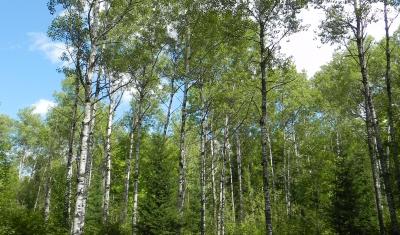Forests & Woodlands
 The climate changes expected over the next century will have huge consequences for ecosystems and the benefits they provide, including the provision of wood and fuel, food, temperature and flood regulation, erosion control, recreational and aesthetic value, and species habitat, among others.
The climate changes expected over the next century will have huge consequences for ecosystems and the benefits they provide, including the provision of wood and fuel, food, temperature and flood regulation, erosion control, recreational and aesthetic value, and species habitat, among others.
Climate changes are likely to affect important ecological processes that will, in turn, affect key natural resources. For example, temperature and precipitation changes could mean that insects, wildfire, invasive plants, and forest diseases will become more frequent in some areas of the country. The emissions that cause climate change also lead to air quality problems that put additional stress on trees.
Continue to the full text Forests in a Changing Climate or browse related content:
-
Disturbances and Stressors
Sun streams through smoke at the Whiskey Complex Fire. The Whiskey Complex Fire in the Umpqua National Forest near…
-
Bioenergy in a Changing Climate
Dr. Manyowa (Norman) Meki (USDA ARS) is gathering field data and simulating several types of biofuels.
-
Growing Seasons in a Changing Climate
The frost-free season length, defined as the period between the last occurrence of 32°F in the spring and the first…
-
Forest Management with Providence Water
In the Northeast, climate trends include more rain and more frequent heavy rain events. In addition, warming…
-
Monongahela Forest Restoration
Healthy and diverse forests are more resilient to variations in the climate. Some native plants have traits that make…
-
Dickinson College Farm's Silvopasture
Farmers in the Northeast are exploring options to adapt to the changing climate. Higher average temperatures and more…
-
Northwest Forestry, Weather and Climate
Understanding current weather and climate is important to supporting sustainable timber production in the Northwest.…
-
Forests in a Changing Climate
The aerial application of yellow straw continues to mitigate soil and ash runoff from the mountainous terrain leading…










